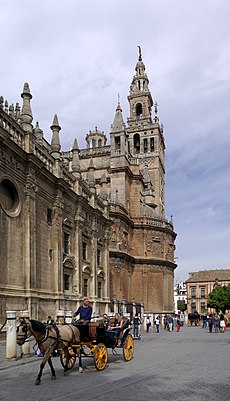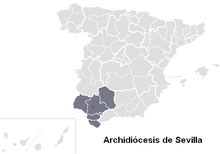Archdiocese of Seville
|
Archdiocese of Seville Archidioecesis Hispalensis Archidiócesis de Sevilla |
|
|---|---|

|
|
| Location | |
| Country | Spain |
| Ecclesiastical province | Seville |
| Statistics | |
| Area | 14,036 km2 (5,419 sq mi) |
| Population - Total - Catholics |
(as of 2010) 1,900,224 1,890,000 (99.5%) |
| Information | |
| Denomination | Roman Catholic |
| Sui iuris church | Latin Church |
| Rite | Roman Rite |
| Established | 3rd Century (As Diocese of Seville) 4th Century (As Archdiocese of Seville) |
| Cathedral | Cathedral of St Mary in Seville |
| Current leadership | |
| Pope | Francis |
| Metropolitan Archbishop | Juan Asenjo Pelegrina |
| Suffragans |
Diocese of Cádiz and Ceuta Diocese of San Cristóbal de La Laguna Diocese of the Canaries Diocese of Córdoba Diocese of Huelva Diocese of Jerez de la Frontera |
| Auxiliary Bishops | Santiago Gómez Sierra |
| Emeritus Bishops | Carlos Amigo Vallejo Cardinal Archbishop Emeritus (2003-2009) |
| Map | |
 |
|
| Website | |
| Website of the Archdiocese | |
The Archdiocese of Seville is part of the Catholic Church in Seville, Spain. The Diocese of Seville was founded in the 3rd century. It was raised to the level of an archdiocese in the 4th century. The current Archbishop is Juan José Asenjo Pelegrina. It has the suffragan dioceses of:
During Roman times Seville was the capital of the Province of Baetica, and the origin of the diocese goes back to apostolic times, or at least to the 1st century. Saint Gerontius, Bishop of Italica, preached in Baetica, and without doubt must have left a pastor of its own to Seville. It is certain that in 303, when Saints Justa and Rufina were martyred for refusing to adore the idol Salambo, there was a Bishop of Seville named Sabinus, who assisted at the Council of Illiberis in 287.
Zeno (472-486) was appointed vicar apostolic by Pope Simplicius, and Pope Hormisdas gave the same charge to Bishop Sallustius in the provinces of Baetica and Lusitania. However, the see was rendered illustrious above all by the holy brothers Saints Leander and Isidore. The former of these contributed to the conversion of Saint Hermengild and Recared, and presided at the Third Council of Toledo in 589. While the latter presided at the Fourth Council of Toledo and was the teacher of medieval Spain.
...
Wikipedia
